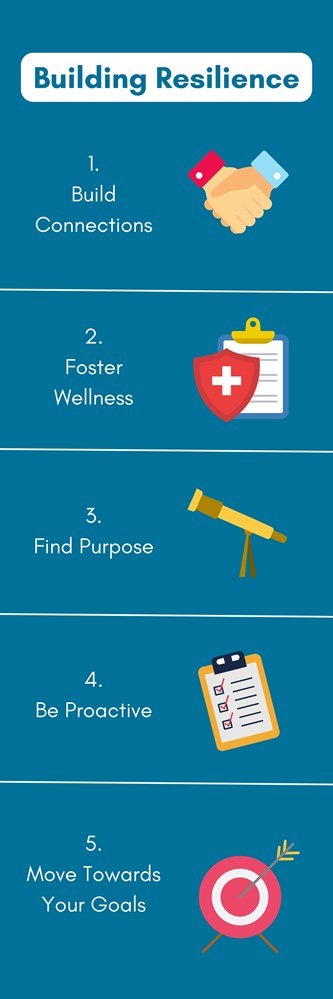What is Resilience?
Psychologists define resilience as the process of adapting in the face of adversity, trauma, tragedy, threats, and/or significant sources of stress. Resilience involves “bouncing back” from difficult experiences. Resilience is about being able to process and understand your response to adversity and actively work through it.
Life does not come with a road map—everyone will experience stressors and challenges. These adversities affect each of us differently as related to our thoughts, emotions, reactions, and behaviors. Becoming more resilient helps us get through difficult circumstances, empowers individual growth, and can improve our lives. Resilience allows us to adapt to challenges and situations, and manage anxiety and stress so it doesn’t impair our day-to-day functioning.
What is Not Resilience?
Being resilient does not mean you will not experience adversity or distress. While certain factors might make some of us more resilient than others, resilience is not considered a personality trait only some possess. Resilience is not a choice, and a person should not be blamed for not being resilient according to a certain standard. Resilience is also not numbing, ignoring, or being in denial.
How to Build Resilience
Resilience is not an extraordinary ability, but an ordinary one. Everyone can foster and improve their resilience. Resilience involves behaviors, thoughts, and actions you can learn and develop. Keep in mind, increasing resilience takes time and intentionality.
1) Build Connections.
Prioritize relationships. Connecting with empathetic and understanding people can remind us we are not alone. Focus on finding trustworthy and compassionate individuals who validate your feelings. Adversity can lead us to isolate ourselves, but it is important to accept help and support from people who care about us. Whether you go on a weekly date night with your partner or plan a lunch out with a friend, try to prioritize genuine connections with people who care about you. Along with one-on-one relationships, some people find support in groups, such as faith-based communities or other local organizations. Research groups in your area that provide support and a sense of purpose or joy.
2) Foster Wellness.

Take care of your body. Give your body the resources it needs to manage stress. Self-care is a legitimate practice for mental well-being and building resilience. Stress is as physical as it is emotional. Practicing positive lifestyle factors, such as proper nutrition, appropriate sleep, hydration, and regular exercise can strengthen your body so it is better able to adapt to stress. Practicing mindfulness, such as mindful journaling, yoga, and/or other practices like prayer or meditation can help build resilience. When you journal, meditate, or pray, focus on positive aspects of your life, and recall the things you are grateful for, even during personal struggles. Avoid negative outlets, such as alcohol, drugs, or other substances.
3) Find Purpose and/or Help Others.
Whether you volunteer at local shelter or support a friend in their own time of need, getting involved can give you a sense of purpose, foster your self-worth, and connect you with other people—which in turn can grow your resilience.
4) Be Proactive.
Acknowledge and accept your emotions during adversity. Fostering self-discovery is important and you can do this by asking yourself, “What can I do about a problem in my life?” If a problem seems too overwhelming, break it down into manageable parts. Look for opportunities for self-discovery that will prepare you for stressful times.
5) Move Towards Your Goals.
Develop realistic goals and commit to taking a step towards them regularly, even if it seems like a small accomplishment. This enables you to move toward the things you want to accomplish instead of focusing on tasks or things that seem unachievable or insurmountable. You can ask yourself, “What’s one thing I can accomplish today that will help me move in the direction I want to go?”
6) Embrace Healthy Thoughts.
Keep things in perspective. How you think can play a significant part in how you feel and how resilient you are when faced with adversity.

Resist “thinking traps,” such as:
- Black-and-white thinking: Assuming everything is either perfect and wonderful, or terrible.
- Catastrophic thinking: Expecting the worst possible outcome and believing you cannot cope if that outcome occurs.
- Predicting the future: Imagining you know what will happen in the future.
You can avoid these traps by trying to notice when you are spiraling into a trap. Be more realistic or holistic about your thoughts: Ask yourself, or talk with a trusted friend or family member, about what is real and not real about your thoughts. What are the gray areas? Are you missing “in-between” possibilities that are more realistic? You could also use a coping mantra and come up with a phrase to help you, such as “I’m doing the best I can, and I’m going to be OK.” Try to adopt a more balanced and realistic thinking pattern. If you feel overwhelmed, remind yourself that what happened is not an indicator of your future, and that you are not helpless. You may not be able to change a highly stressful event, but you can change how you interpret and respond to it.
7) Accept Change.
Accepting change can be difficult but it is a part of life. Accepting circumstances that cannot be changed helps you focus on circumstances you can change and do something about.
8) Maintain A Hopeful Outlook.
It can be hard to remain positive when life is not going your way. An optimistic outlook empowers you to expect good things will happen. Try visualizing what you want, rather than worrying about what you fear or what cannot be. Note any subtle ways in which you start feeling better as you deal with difficult situations.
9) Learn From Your Past.
Looking back at who or what was helpful in previous times of distress or adversity can help you discover how to respond effectively to new difficult situations. This can also remind you of where you have been able to find strength and how you have learned from those experiences.
10) Seek Help.
Getting help when you need it is crucial in building resilience. You may be able to use your resources and the strategies above to build resilience. If you feel stuck on the road to building resilience, consider seeing a licensed mental health professional who can assist you in developing an appropriate strategy for moving forward. Get professional help if you are unable to function as well as you would like, or if you are unable to perform basic activities of daily living as a result of a traumatic or stressful life experience. Most importantly, remember you are not alone. While you may not be able to control all of your circumstances, trusted mental health professionals can help you build resilience by focusing on the aspects of your life you can manage.


